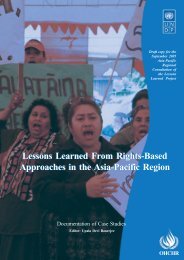View / Download - HRBA Portal
View / Download - HRBA Portal
View / Download - HRBA Portal
You also want an ePaper? Increase the reach of your titles
YUMPU automatically turns print PDFs into web optimized ePapers that Google loves.
Towards Inclusive Governance: Promoting the Participation of Disadvantaged Groups in Asia-Pacific4. RECOMMENDATIONSIn order to ensure access to justice for Adivasis, it isessential that a common ground is developedfor discourse and exchange between Adivasiorganizations and existing institutions of justicedelivery at both the state and non-state levels.The key points of any such discussion must includethe adoption of commitments, by both state andnon-state actors:• To end racial,religious and gender discriminationin both law and practice;• To undertake necessary legal and policyreforms;• To enable collaboration among Adivasiorganizations, individuals and mainstreamjustice delivery organizations;• To strengthen community-based organizationsamong Adivasis so that they are able toparticipate fully in political, economic and socialdevelopment, and also to deliver access to justice;• To establish a clear division of responsibilities andchains of command between differentadministrative authorities to ensure accountabilityfor purposes of good governance.Improvement of the existing legalframeworkRecognition of parallel legal systemsThe formal legal system should recognize, to theextent that they conform with human rightsnorms, the decisions of the traditional disputeresolution bodies operating within most Adivasicommunities (particularly in the plains).Recognition of prescriptive and customaryrights to land and forests• For the concerned communities, preservationof certain areas as common property forcommunity forests, communal grasslandsand grazing lands, and jum cultivation orother agricultural cultivation;• Establishment of an elected body for thepreservation and management of suchcommon property;• Preservation of water bodies as commonproperty for use by Adivasis, rather thanallocating/leasing/licensing them to anyindividual or corporate body as privateproperty;• Recognition of customary rights ofinhabitants of reserved forests.Compilation of existing laws and customsReview and dissemination of existingcompilations and analysis of Adivasi laws andpractice in easy-to-understand and accessibleformats. In the CHT, recognition and partialcodification/documentation may be possiblethrough the HDCs and/or the CHTRC;Implementation of existing laws• Ensuring application and effectiveimplementation of section 28 of the ForestAct within the CHT by assignment of rightsby the government to inhabitants ofreserved forests or, alternatively, by ensuringthat the majority of income from the sale offorest produce is given to village forestcommunities, through agreement (followingprecedents established in India, for example);38



